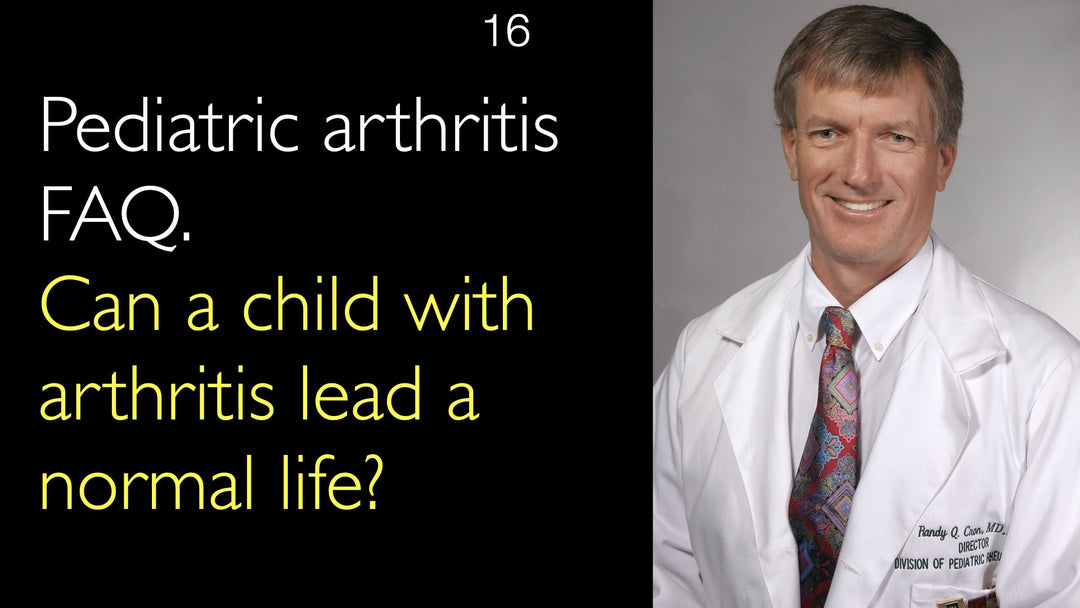Leading expert in pediatric rheumatology, Dr. Randy Cron, MD, explains the role of diet and nutrition in juvenile arthritis. He clarifies common misconceptions about children outgrowing juvenile idiopathic arthritis (JIA). Dr. Randy Cron, MD, discusses the importance of a healthy weight and balanced diet for joint health. He provides realistic expectations about disease remission and long-term management for young patients.
Juvenile Arthritis Diet, Prognosis, and Common Patient Questions
Jump To Section
- Diet and Nutrition in Juvenile Arthritis
- Weight Management for Joint Health
- Outgrowing Juvenile Arthritis Myth
- Systemic JIA and Remission Rates
- Long-Term Disease Management
- Treatment and Remission Possibilities
- Full Transcript
Diet and Nutrition in Juvenile Arthritis
Dr. Randy Cron, MD, addresses one of the most common questions from parents about juvenile arthritis and diet. Families often ask if specific dietary changes can improve their child's inflammatory condition. Dr. Randy Cron, MD, explains that while a healthy diet is important, no specific foods dramatically reduce arthritis inflammation.
He notes that except for patients with celiac disease, where a gluten-free diet reduces inflammation, most dietary interventions show limited results. Some early studies suggested omega-3 fatty acids from oily fish like salmon might have anti-inflammatory effects. However, Dr. Randy Cron, MD, emphasizes these effects are minimal compared to modern medications like TNF inhibitors.
Weight Management for Joint Health
Dr. Randy Cron, MD, highlights the importance of maintaining a healthy weight for children with arthritis. Excess weight places additional stress on joints, worsening arthritis symptoms regardless of the underlying inflammation. A balanced diet with fruits and vegetables supports overall health.
Dr. Cron specifically addresses nutritional needs for teenage girls with juvenile arthritis. Ensuring adequate iron intake is particularly important for this demographic. During his discussion with Dr. Anton Titov, MD, he reinforces that while nutrition supports health, it doesn't replace medical treatment for controlling disease activity.
Outgrowing Juvenile Arthritis Myth
Dr. Randy Cron, MD, confronts the persistent myth that children outgrow juvenile arthritis. He explains that this outdated information continues to circulate despite evidence to the contrary. Most children with juvenile idiopathic arthritis will not outgrow their condition.
Dr. Randy Cron, MD, emphasizes the importance of setting realistic expectations for families. He avoids telling parents their child will outgrow arthritis because this creates false hope for most patients. The disease typically continues into adulthood, requiring transition to adult rheumatology care.
Systemic JIA and Remission Rates
Dr. Randy Cron, MD, discusses the specific subset of patients with systemic juvenile idiopathic arthritis. Approximately one-third of children with systemic JIA may experience disease resolution within six months. However, systemic JIA represents only about 10% of all JIA cases.
This means only a very small minority of children with juvenile arthritis truly outgrow their condition. Dr. Randy Cron, MD, notes that physicians cannot predict which patients might achieve spontaneous remission. The conversation with Dr. Anton Titov, MD clarifies that even these rare cases of resolution don't represent a predictable outcome for most families.
Long-Term Disease Management
Dr. Randy Cron, MD, explains that juvenile arthritis is typically a chronic condition requiring long-term management. Most patients continue to have disease activity into adulthood and transition to adult rheumatologists. This continuity of care ensures proper management throughout the lifespan.
The goal of treatment shifts from "outgrowing" the disease to achieving sustained remission. Dr. Randy Cron, MD, emphasizes that modern treatments can effectively control symptoms and prevent joint damage. Regular follow-up with rheumatology specialists remains essential for optimal outcomes.
Treatment and Remission Possibilities
Dr. Randy Cron, MD, discusses the realistic possibilities of achieving remission in juvenile arthritis. While complete cures remain elusive, modern medications can induce significant disease control. Many patients achieve remission off medications for varying durations.
Some children may experience drug-free remission for short periods, while others enjoy years without active disease. Dr. Randy Cron, MD, cautions that because arthritis can reactivate, these periods shouldn't be considered cures. The discussion with Dr. Anton Titov, MD highlights ongoing research into smarter drug use and novel therapies that may eventually provide more permanent solutions.
Full Transcript
Dr. Anton Titov, MD: What are the top two or three questions that patients ask you, patients' parents? Because you deal with pediatric patients? What are the questions that patients should ask, but perhaps they don't do so as often as they should?
Dr. Randy Cron, MD: I would say one of the most common questions we get is, how can we change the diet? Is there anything that we can do by what we put into our child's mouth, for example, that will help their disease? And gosh, if there was something that we could tell them or give them, we'd be the first ones to do it.
But there really isn't, unfortunately, other than eating a basic healthy diet, which is always a good idea. Being overweight is also going to make it tough on your joints, whether you have arthritis or not. It certainly makes it worse if you have arthritis.
So being a healthy weight is important. A well-rounded diet with fruits and vegetables is right, and making sure if you're a girl, particularly a teenage girl, getting enough iron in your diet by some measure.
But in terms of the inflammation, there aren't any great diets out there. Now, having said that, if you have celiac disease and a subset of patients do, then yeah, you want to be gluten-free to cut back on that type of inflammation.
But for the most part, there aren't great things. There was some data, although there's more recent data that suggests that may not be true, that omega-three fatty acids, like you would see in certain oily fish, like salmon, for example, may have anti-inflammatory effects.
But some of the early big studies that demonstrated that showed you need to take a lot of it, which is okay if you don't mind fish breath with those giant horse pills taken multiple ones per day. Maybe roughly equivalent to like a baby aspirin a day.
So it's not like they did nothing, but relative to things like a TNF inhibitor, not much. But okay, and people want to eat their way to health, and it's understandable. You would want people to believe that, gosh, I just changed my diet, this will get better.
And like I said, as clinicians, we would hope that would be the case, too. But for the most part, that's not the case. But maybe time will tell; maybe we'll learn something that we will. But I think we probably would have figured this out by now.
That's probably one of the most common questions we get. Another question, particularly for children with arthritis, which is for a pediatric rheumatologist our most common chronic disease that we take care of, they will ask, will my child outgrow this?
And that's because this used to be told to families that they will outgrow this. And it's not really true, unfortunately, for the most part. And so I personally don't tell them that they will outgrow it because for the bulk of the patients, that's not going to be true.
If they outgrew it, yay, great! But I don't want to give them false expectations. The one subset of kids under the Juvenile idiopathic arthritis umbrella that actually do have the disease go away within six months is maybe a third or a small subset of the one subset of kids with the systemic form of disease, the systemic JIA, the kids at risk for macrophage activation syndrome, for example.
Approximately one-third of those. And they already make up only about 10% or one in 10,000. So maybe one in 30,000 kids with JIA will outgrow it. We have no idea which of those kids are. Maybe it's a severe illness, maybe it's the mildest. We just don't know.
But for the most part, kids have chronic disease, and it goes into adulthood, and they're taken care of by adult rheumatologists after they graduate out of our pediatric clinics.
That's not to say we can't get them into remission. We can often get them into remission off drugs, sometimes for short periods of time, sometimes for years at a time. But because it can come back, I still don't think it's fair to call it a cure.
But someday, hopefully, we will have approaches either with the drugs we have now, a smarter way of using them, or with novel therapies to get them to cure them. But at this point, we don't really have a cure for diseases.
So that's the other common question: will my child outgrow this? And it's still out there, even in the pediatric community, that kids will outgrow this. But for the most part, that's not true, at least for juvenile arthritis, and actually for many of our rheumatic conditions.






